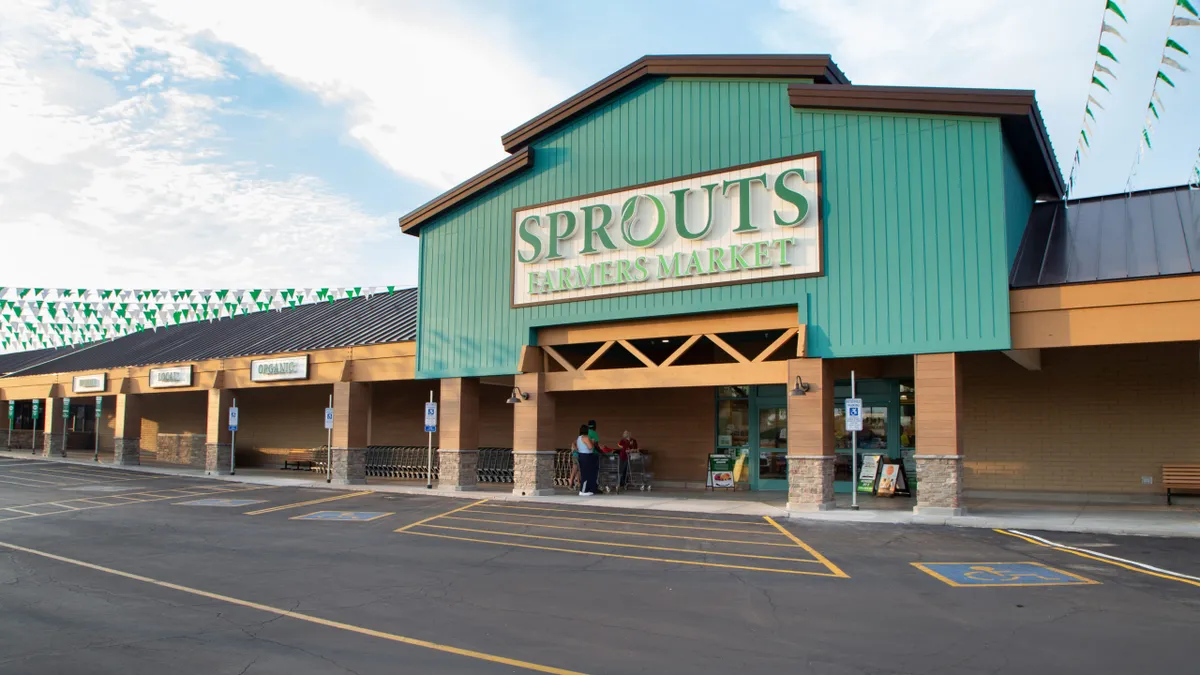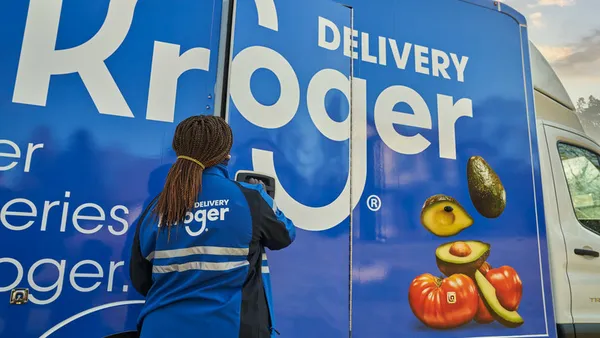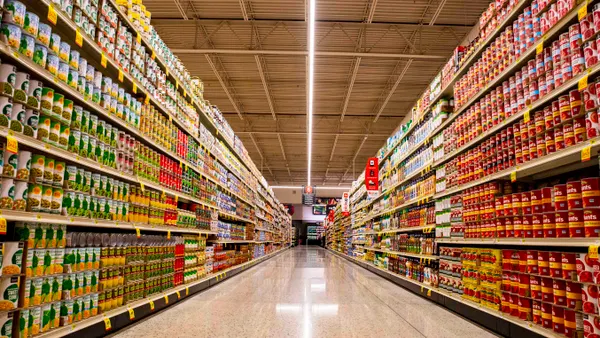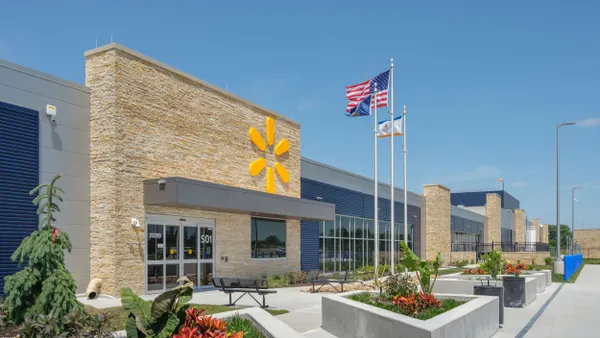The pandemic has not been kind to Sprouts Farmers Market. While many grocers experienced a sales boom during the global health crisis as shoppers consolidated trips and spent more at stores and online, Sprouts, which sells a smaller range of specialty and natural products, didn’t benefit nearly as much.
Although other grocers’ comparable store sales soared early in the pandemic, Sprouts posted only modest increases in the key metric. After lapping those elevated results last year, the company has struggled to regain positive comps once again, doing so just barely earlier this month, when it reported a 1.6% increase in Q1 as store growth and inflation helped pad the top line results.
Now, Sprouts executives say rising prices and other macroeconomic factors are denting the number of products its shoppers are putting in their baskets, dealing yet another setback for the company’s plan to improve results and transform the business.
During Sprouts' earnings call on May 4, CEO Jack Sinclair said Sprouts’ management sees ways it can boost the number of items shoppers buy even as many of them become increasingly price sensitive. These include rolling out a better stock management system, introducing hundreds of new products to stores and injecting a “selling culture” into its stores that plays up customer interaction, product sampling and other energizing initiatives.
"We want to bring more buzz to our stores," Sinclair said during the call, noting that the pandemic has tamped down Sprouts' ability to play up the fun, farmstand approach to retailing he has envisioned as key to its revitalization.
But investors weren’t sold on the plan, with the company’s stock price falling nearly 25% after it released its results.
Moreover, the pileup of underperforming quarterly results is starting to wear thin those investors' patience in the publicly traded company. Three Wall Street analysts interviewed by Grocery Dive said the difficulty Sprouts has been having growing its same store sales is an especially pressing concern.
“I think something needs to fundamentally change with Sprouts’ growth strategy, and this change needs to come soon, because otherwise they’ll be in for some pretty dark times ahead,” said Arun Sundaram, an analyst with CFRA Research, noting that Sprouts has been unable to improve its comp sales even as other grocers are turning in robust top line results.
Sprouts' YoY comps
Sundaram said that the many fixed costs inherent in retail mean Sprouts does not have much time to spare before its anemic sales start to significantly damage its bottom line, adding that the situation could grow more acute if inflation starts to moderate and squeezes top-line revenue even further. “I think they need to act fast and really start thinking about how they can change their strategy and try to spur more traffic into their stores,” he said.
Scott Mushkin, CEO of R5 Capital, echoed Sundaram’s sense that Sprouts needs to act fast to attract more interest from shoppers. "They need to figure this out, and they probably have to the end of the year," or maybe even less time than that, Mushkin said in an interview. “They have to bring some excitement to the store … the food doesn’t sell itself.”
In a note to investors follow Sprouts' Q1 earnings, Mushkin noted: "With expenses throughout the economy growing quickly, the clock is ticking, in our minds, around getting same store sales to accelerate."
Mushkin and Sundaram both said they think Sprouts should engage investment bankers to explore the possibility of taking the company private. Mushkin pointed to Albertsons, which recently announced it's undergoing a strategic review to evaluate its options.
Sprouts, which formerly was controlled by private equity firm Apollo Management, went public in 2013 in a well-received initial public offering, but its stock today is trading well below its level when the company first entered the stock market.
“At a certain point, we do think they can be an attractive takeover target,” Sundaram said.
Part of Sprouts’ problem, analysts say, is that it’s trying to execute a business improvement plan that would be difficult under normal circumstances, let alone during a pandemic and inflationary period.
That plan, which Sinclair set in motion several months after being named CEO in 2019, has included boosting company efficiency by developing smaller, more productive stores and building new stores closer to company warehouses. The grocer has also embraced its identity as a specialty grocer aimed at health-conscious consumers, but that effort to stand out does not appear to be resonating well with shoppers, said Karen Short, managing director of equity research at Barclays.
“They're trying to be [a specialty retailer] and differentiated when that's not what they stood for, [even] when they were performing extremely robustly. So I think you just have a confused customer,” Short said.
Short said that she thinks Sprouts is opening new stores at too fast a clip given the difficulty it is having attracting demand from shoppers.
“They have very high [store] unit growth, but they're still not generating same store sales. That is not a sustainable situation. You can't continue to grow profit without having a robust top line,” Short said.
'I don't think they've done a good job of clearly picking a lane'
Compounding matters, the pandemic forced Sprouts to turn away from its improvement plan and prioritize in-store safety measures alongside managing a strained supply chain. Sinclair said during its earnings call that the company has “turned off a lot of the magic” that defined the company over the past two years or so.
The chain, he said, is now poised to reconnect with its roots as a fun, high-energy natural market: “We’re back to the early days."
But sources say the company’s stores still have a long way to go to meet that goal. David Browne, a California-based consultant for the natural and specialty food industry who frequently visits Sprouts locations, said the stores are a mishmash of natural and specialty selections that lack a cohesive vision. Browne said he’s noticed that items Sprouts carries have artificial ingredients, which he said is a turn off for dedicated natural foods consumers. At the same time, the company doesn’t carry enough premium items to be appealing to gourmet shoppers, he added.
The shopping experience is inconsistent from one aisle to the next, Browne noted, with some containing a range of value, mid-tier and premium products while others are heavy with private label items and don’t have premium choices.
“I don’t think they’ve done a good job of clearly picking a lane, and over time I think they’ve been surpassed as a result,” Browne said.
To hear Sinclair talk about the company, the retailer has picked a lane. It wants to become a retailer for high-value, health-conscious shoppers and is rolling out innovative products and services for those customers.
But Browne said that hasn’t yet materialized. “That makes sense on paper. I have not seen that even directionally when I shop the stores,” he said.
Sundaram agreed that Sprouts has not been successful at telling consumers why they should shop at its stores.
“I don't think they're doing a good job really educating the consumer and showing them how they have truly differentiated products, very fresh products at a good value,” said Sundaram. “I don't think just saying that you have organic, fresh products is a differentiator, because every grocer is investing in fresh, organic, private label, all those things.”
Sprouts’ struggles underscore a major competitive challenge specialty grocers face as conventional outlets stock more of the natural, organic and premium items that used to make them so unique. Over the past several years, companies like Walmart, Kroger and Costco have accounted for a growing percentage of specialty food sales. According to data from the Specialty Foods Association (SFA), natural and specialty stores accounted for 33% of all specialty food sales in 2021, while non-specialty channels including grocery, drug, dollar, mass merchandisers and Walmart, accounted for 67% of sales.
Between 2019 and 2021, the growth of specialty food sales at mainstream outlets dwarfed that of natural and specialty stores, increasing 26.7% compared to 8.6%, according to the SFA.
Specialty retailers have taken steps to set themselves apart from mainstream grocers. Whole Foods Market, which ran afoul of investors several years ago after it lost its selling edge over conventional grocers like Kroger, has projected a commitment to local and niche products in recent years while also sprinkling in cutting edge technology courtesy of its owner, Amazon, which bought the chain in 2017. Natural Grocers has positioned itself as a healthy grocer, while Earth Fare, which relaunched in 2020 shortly after going bankrupt, focuses on strict product standards and unique finds.
Ken Fenyo, president of research and advisory at Coresight Research and a former vice president of loyalty and digital at Kroger, said conventional grocers are continuing to evolve their specialty assortment. Nowadays, many stock not just natural and organic products but also keto-friendly, gluten-free, low-sugar and other wellness-focused varieties, making it even more challenging for specialty grocers to stand out.
"If I go back five or 10 years, [specialty grocers] were unique because they had a wider variety of natural and organic food. But the conventional grocers have really upped their game in terms of the quality of their perishables and the range of natural foods they sell," Fenyo said. "So just offering those items alone makes it harder to differentiate yourself."













